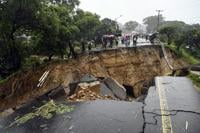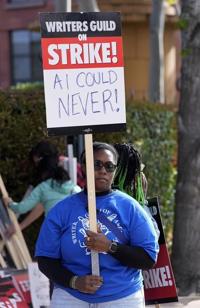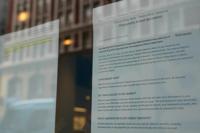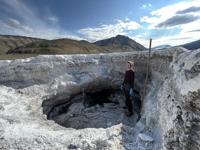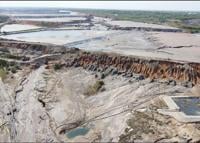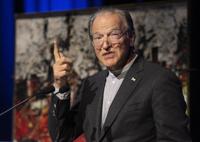BOSTON (AP) — Ukrainians reacted Thursday with puzzlement and some ire to comments by a top Starlink official that their country has “weaponized” the satellite internet service, which has been pivotal to their national survival.
President Gwynne Shotwell of SpaceX, which runs Starlink, was also reported to have said at the same venue Wednesday that the Elon Musk-controlled company has taken unspecified action to prevent Ukraine's military from using Starlink technology against Russian invaders.
The network of low-orbiting satellites has been crucial to Ukraine's use of battlefield drones — a central fixture of the year-old war — and the country's defenders have no viable alternative. The satellite links help Ukrainian fighters locate the enemy and target long-range artillery strikes.
Onstage at a conference in Washington, D.C., Shotwell said: “We were really pleased to be able to provide Ukraine connectivity and help them in their fight for freedom. It was never intended to be weaponized. However, Ukrainians have leveraged it in ways that were unintentional and not part of any agreement."
Speaking separately to reporters from The Wall Street Journal and other news organizations afterward, Shotwell said SpaceX has worked to restrict Ukraine's use of Starlink for military purposes.
“There are things that we can do to limit their ability to do that,” they quoted her as saying without offering details. “There are things that we can do, and have done.”
That drew the ire of a top aide to President Volodymyr Zelenskyy. Mykhailo Podolyak said SpaceX needs to decide whether it is on the side of Ukraine's right to freedom or Russia's “'right' to kill & seize territories."
It was not clear whether Shotwell’s comments Wednesday were made at the urging of Musk, the founder, CEO and chief engineer of SpaceX. An email to SpaceX seeking comment was not immediately returned.
There was no indication of any interruption to Starlink service in Ukraine.
In a statement, the country's Minister of Digital Transformation Mykhailo Fedorov reported "no problems with the operation of Starlink uplink terminals in Ukraine.” A ministry official familiar with the situation said checks Thursday of cities near the war's front lines found no indications of trouble with Starlink coverage. The official spoke on condition they not be further identified.
The 2,200-satellite constellation has been a lifeline for the country since Russia’s Feb. 24 invasion, especially vital as Ukraine struggles to keep electrical power and telecommunications operating under withering Russian missile and drone attacks on civilian targets.
In the statement, Fedorov touted the arrival of the first of a new batch of 10,000 terminals provided by the German government, adding: “Starlinks help save thousands of lives daily. The energy infrastructure continues to work due to Starlinks. Doctors perform complex surgeries thanks to the connection that Starlinks provide.”
The Thursday statement called Musk “one of the biggest private donors of our future victory,” estimating SpaceX's contributions as worth more than $100 million. “We hope for further stable work of Starlinks in Ukraine.”
A Ukrainian military official called Shotwell's statements “strange” given the well-established fact of the country's use of Starlink as a combat tool.
Musk caused a stir in October when he publicly of Starlink's Ukraine effort.
The billionaire and Twitter owner later backed down. Earlier that month by arguing on Twitter that to achieve peace, Russia should be allowed to keep the Crimean Peninsula, which it seized in 2014. He also said Ukraine should adopt a neutral status, dropping a bid to join NATO.
About the same time, Starlink terminals stopped working in newly liberated territories at the Ukraine-Russia front lines in the Kherson region. Ukrainian officials later said that was because the speed of their reconquest had pushed forces into areas Starlink that had “geo-fenced” to prevent Russia from using the service.
In a late December interview, Fedorov told The Associated Press that 24,000 Starlink terminals were operating in the country, most provided by donors.
—-
AP military writer Tara Copp in Washington contributed to this report.
Follow AP’s coverage of the war in Ukraine at








